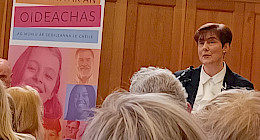
Leading Education Groups Demand Urgent Increase in School Funding Ahead of Budget 2025

5 months ago
Press Release - 23rd September 2025
Leading Education Groups Demand Urgent Increase in School Funding Ahead of Budget 2025
A coalition of Ireland’s primary and special school management bodies, staff, parents, and children has issued an urgent appeal to Minister McEntee and the Government to address a growing funding crisis in schools.
The group welcomes recent positive steps, including the increase in the basic capitation rate and the introduction of free schoolbooks and meals. However, they warn that these measures are not enough to offset the dramatic rise in school running costs over recent years.
A comprehensive analysis of school accounts, commissioned by the CPSMA, reveals:
- Heating costs have soared by 83% and water/refuse costs by 51% since 2018/19.
- Utility costs now account for 6.1% of school expenditure, up from 3.3% in 2019.
- Accounting, auditing, and management information system expenses have also risen sharply.
- The average primary school now faces a €17,000 deficit on capitation-related income and expenditure.
Despite cost-of-living supports, most schools are struggling to balance their books, with many facing the prospect of impossible financial decisions in the coming year.
The coalition is calling for:
- An immediate increase in the basic capitation rate from €224 to at least €299 per pupil.
- Substantial increases across all other grant categories, including minor works, ICT, and ancillary grants.
- A detailed analysis of the actual running costs for schools facing additional challenges, such as those in temporary accommodation or with special classes.
The signatory organisations stress that underfunding directly impacts children and families, particularly those in disadvantaged communities. They urge the Government to demonstrate its commitment to free, quality education by ensuring schools are adequately funded and families are not forced to make up the shortfall through voluntary contributions or fundraising.
Signatories:
- Caoimhín Ó hEaghra (An Foras Pátrúnachta)
- Ken Fennelly (Church of Ireland Board of Education)
- Seamus Mulconry (CPSMA)
- Emer Nowlan (Educate Together)
- Paddy Lavelle (ETBI)
- Andy Pike (Fórsa)
- Asiya Altawash (Muslim Primary Education Board)
- Eileen O’Rourke (NABMSE)
- Páiric Clerkin (IPPN)
- John Boyle (INTO)
- Niamh Dalziel (St. Vincent De Paul)
Comments from Signatories
- Caoimhín Ó hEaghra, An Foras Pátrúnachta:
“Schools need to be able to focus on the education of children. The increase requested in capitation will allow this to happen. We have raised this lack of funding with this and previous Governments and look to them to act to support schools in providing the education to our children without the constant pressure of lack of funding.”
- Ken Fennelly, Church of Ireland Board of Education:
”For Church of Ireland primary schools, which tend to be smaller, the increased costs over the past number of years are a major challenge. Many schools are fundraising to pay basic bills and this is no way to run an education system. A significant funding investment in schools is needed now to keep pace with the reality of rising costs.”
- Seamus Mulconry, CPSMA:
“Primary schools have always been underfunded but the cost-of-living crises have pushed them underwater. Schools urgently need an increase in capitation just to stay afloat. We can’t focus on a new curriculum if all our focus is on fundraising”
- Emer Nowlan, Educate Together:
“We know that when schools are underfunded, the most disadvantaged children and young people miss out most. Primary education has been underfunded for too long and current funding levels are unsustainable. We are calling on the Government to live up to their commitments and fund schools properly so that all children can access the education they deserve.”
- Paddy Lavelle, ETBI:
"It is imperative the schools do not normalise relying on parental voluntary contributions to compensate for inadequate funding. A significant increase of funding is required to ensure that this is not the case."
- Andy Pike, Fórsa:
“It is the responsibility of every Government to provide adequate funding for the nation’s schools. Unless the current level of funding is significantly increased, schools will run into deficit with costs pushed onto parents, schools may be unable to continue to provide vital services for vulnerable students. We urge the Government to act now to provide the much-needed necessary financial supports to allow our schools to address rising operating costs.”
- Asiya Altawash, Muslim Primary Education Board:
“Rising costs for primary schools in heating, utilities and support services, are placing a growing pressure on already limited budgets. As a result, schools are compelled to make difficult choices and many schools are struggling to maintain quality education without cutting essential supports. To ensure sustainability, equity and the best education for all children, an increase across school grants including the capitation grant is urgently needed.”
- Eileen O’Rourke, NABMSE:
“Special schools have a vast array of extra costs to be borne out of their basic capitation, and these significantly reduce the capacity of the schools to manage their annual budget without compromising on the care/educational needs of their students and health and safety requirements. These extra costs include higher heating bills, electricity bills as a result of running specialist student equipment, and annually increasing insurance costs. Staff training, which is needed annually in order to meet basic health and safety requirements, is another substantial cost which is unique to special schools. Specialised equipment used by students must be maintained and serviced annually, furniture and equipment may need to be replaced, and staff safety equipment must be provided. Communication devices, interpreter and ISL services are very costly for special schools, who also frequently pay as a school for the extra therapy services and support their students need, eg: OT, SLT, equine therapy, judo assist, music therapy, art therapy, and water therapy. The reality is that special schools have to limit trips out of school due to the high cost of bus hire, and the provision of one-to-one support for every child. As more mainstream schools open special classes for students with complex needs, their expenditure will also increase exponentially. We join with the other management bodies in urging the minister to consider the basic functional costs described here, which are wholly necessary for the provision of a safe, secure and appropriate education for our students in special schools and special classes.”
- John Boyle, INTO:
“The 2025/26 primary capitation grant, set at €224 per pupil, falls far short of what is required to operate a modern school. Inflation has driven up the costs of essentials such as energy, insurance, cleaning, and teaching resources. Government’s failure to fund schools has placed an intolerable burden on school communities, with both teachers and parents increasingly involved in fundraising efforts simply to keep the lights on. School leaders have been left under severe stress as they struggle to keep schools running. Every school should receive adequate funding to ensure the continued delivery of primary and special education in their community. This should not depend on cake sales, raffles, or the delaying of bill payments while school management wait for clarity on grants. It is time for a targeted uplift in the primary capitation grant, the main source of school funding. The INTO is calling on government to increase the primary capitation grant by €75 per pupil in Budget 2026. This uplift is essential to support the basic operation of schools and ensure that all children, especially those who experience educational disadvantage, have access to a fully resourced and equitable education system.”
- Páiric Clerkin, IPPN:
“While responsibility for school finances rests with the Board of Management, it is school leaders who inevitably deal with the impact of inadequate funding on a daily basis. The impact of the welcome investment in measures to provide free schoolbooks and hot school meals will be significantly undermined if schools are struggling to keep the lights and the heat on.”
- Niamh Dalziel, St. Vincent De Paul:
“Parents are cutting back on essentials or going into debt to meet voluntary contributions charges. Chronic underfunding forces schools to rely on families. Budget 2026 is this governments opportunity to make free education in Ireland a reality by giving schools what they need to run the school day.”
You can also download the statement in pdf format.



